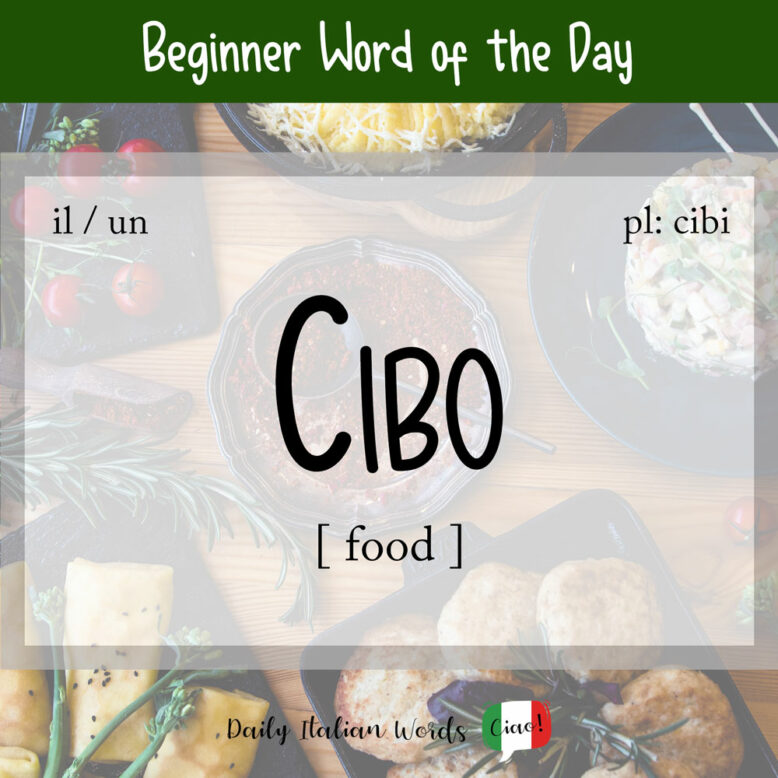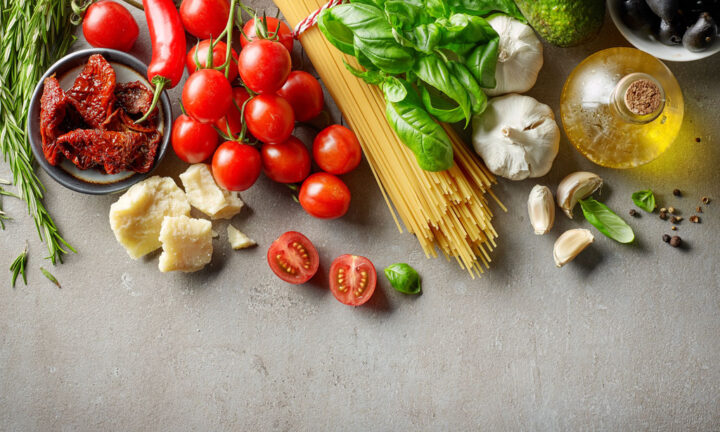Today we’re going to be looking at the most common and colloquial term for food in Italian: cibo (masculine, plural: cibi). Derived from the Latin cibus meaning food, it refers to any nutritious substance that living organisms eat or drink.

In Italy, life revolves around the preparation and enjoyment of good food (cibo buono / buon cibo). Most traditional meals consist of simple ingredients such as pasta, rice, tomatoes, garlic, olive oil, ham and various cheeses which, when combined, result in dishes destined to delight the senses. Rare is it to meet an Italian mother who cooks bad food (cibo cattivo), and rarer still is it to encounter an Italian who will accept poor cooking without a word of complaint!
Ho una passione per il buon cibo italiano.
I have a passion for good Italian food.

There are numerous adjectives you can use to describe the quality of food in Italian besides just buono (good) and cattivo (bad). Let’s take a look at a few of them now!
- cibo pesante = heavy food
- cibo piccante = spicy food
- cibo fritto = fried food
- cibo casalingo = homemade food
- cibo povero = simple food
- cibo sano = healthy food
- cibo fresco = fresh food
As for junk food, Italians have two very specific terms: porcherie and schifezze.
The word cibo applies when talking about food for pets such as dog food (cibo per cani) and cat food (cibo per gatti).
Also interesting is that cibo can be used in its plural form cibi in a wider range of situations than the English food. This is because the English word classifies as a mass noun except when you are talking about different kinds of food. For example:
I gentili clienti sono pregati di non consumare cibi e bevande acquistati all’esterno.
We kindly ask our guests not to consume outside food and beverages.
Transformed into a verb, we get cibare (to feed) and cibarsi (to feed oneself). However keep in mind that in colloquial speech, you are more likely to hear dare da mangiare a instead of cibare.
La mamma ha dato da mangiare al suo bambino.
The mother fed her child.
An alternative to cibo that appears frequently in conversation is cose da mangiare, which literally means things to eat. Yet another synonym is alimento but it tends to be used in more formal or scientific situations and places an emphasis on the nutritional value of the food. The word nutrimento, on the other hand, specifically refers to nutrition or nourishment.
One final word that needs to be mentioned is cucina which means cuisine (amongst other things). This word can work as a synonym for cibo when talking specifically about food from other countries such as, for example, Mexican food (cucina messicana) or Japanese food (cucina giapponese).
Figuratively speaking, cibo may also refer to something that has a positive effect on your mind or soul.
L’arte è cibo per lo spirito.
Art is food for the soul.

Heather Broster is a graduate with honours in linguistics from the University of Western Ontario. She is an aspiring polyglot, proficient in English and Italian, as well as Japanese, Welsh, and French to varying degrees of fluency. Originally from Toronto, Heather has resided in various countries, notably Italy for a period of six years. Her primary focus lies in the fields of language acquisition, education, and bilingual instruction.


